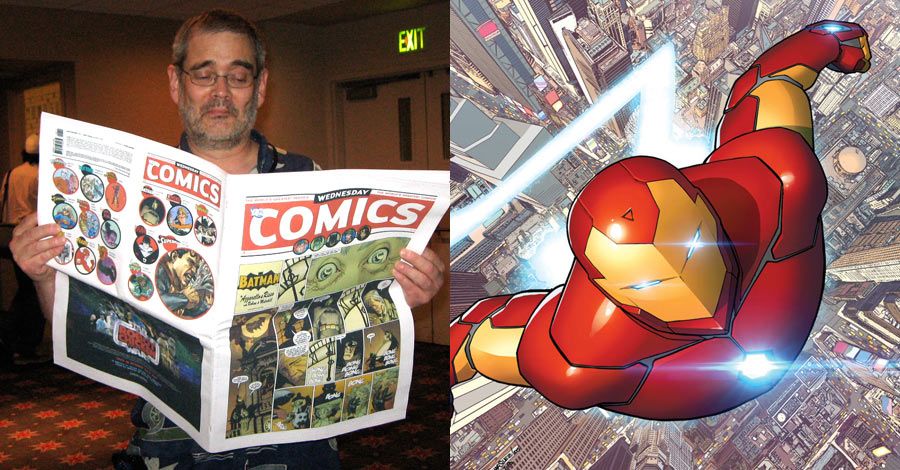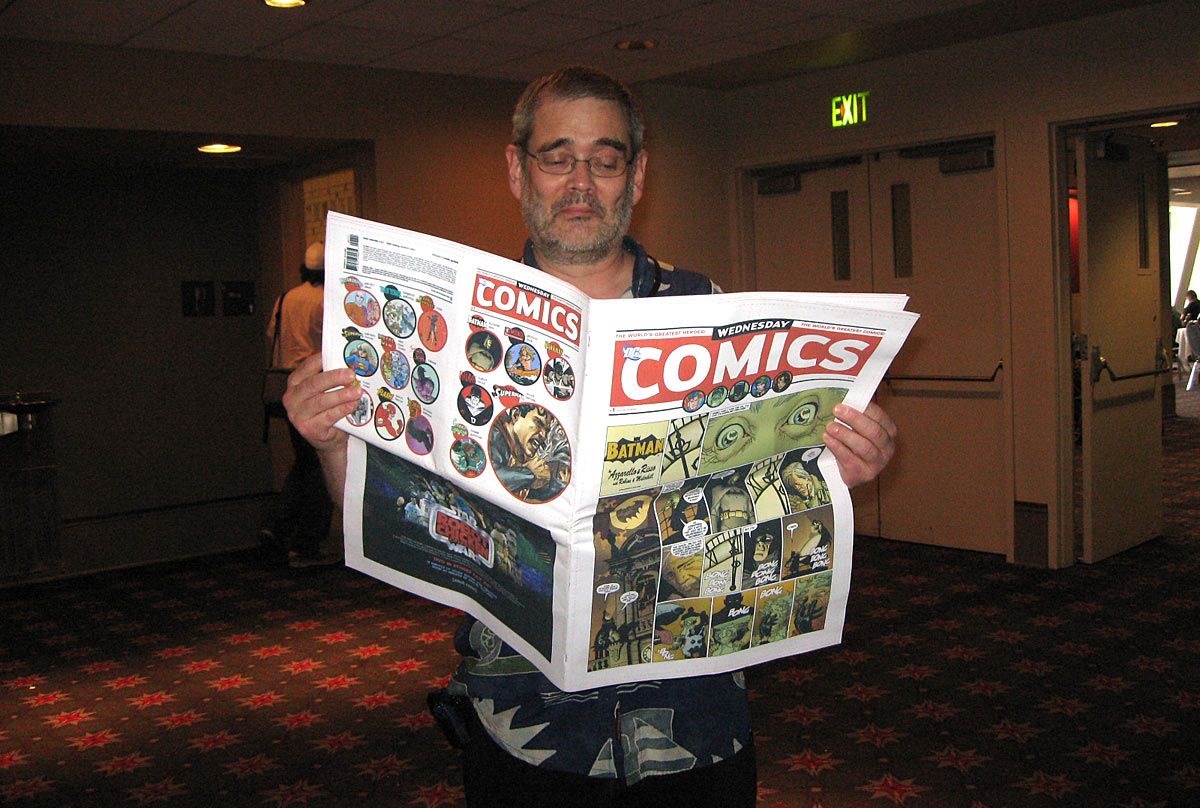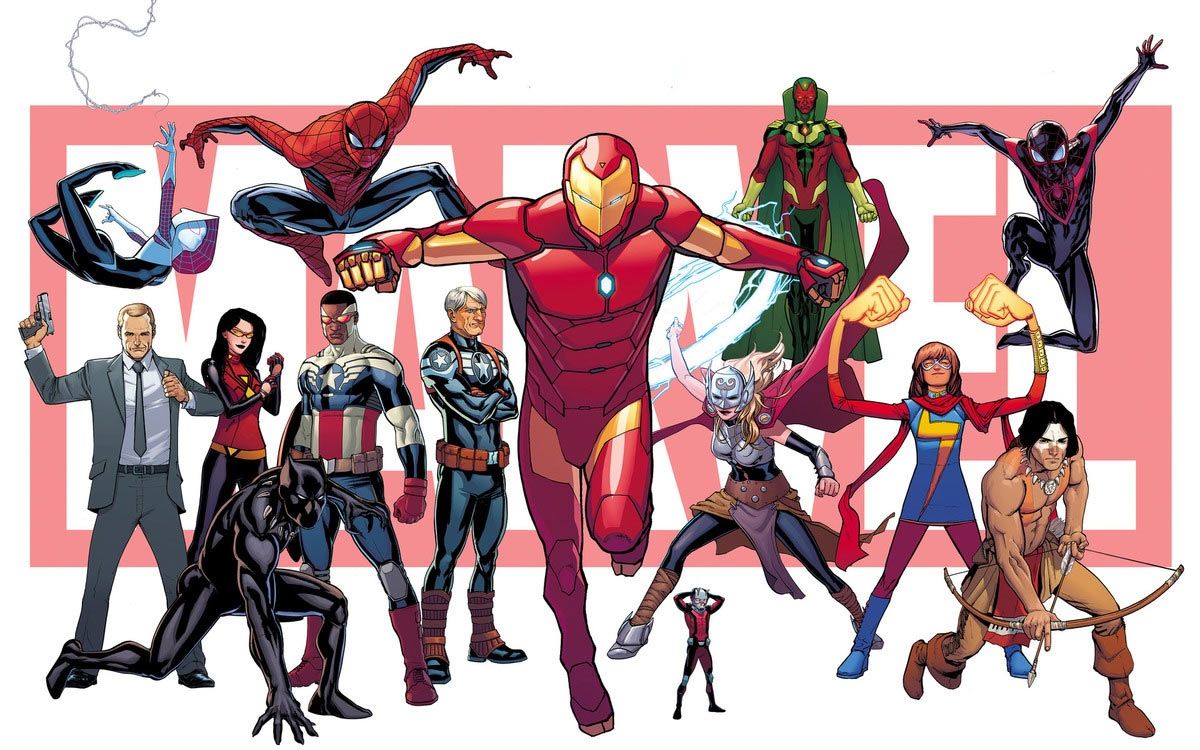I think we all knew that Bob Wayne, the former Vice President of Sales of DC Comics who recently retired, was instrumental to that company's Direct Market retailer-friendly policies, but I don't think that many of us really understood that he was apparently single-handedly keeping them in place. Or, at least that is how it seems to me, given that a bare three months after his retirement, DC has begun changing the rules to no longer protect the DM.
RELATED: Sales Exec Bob Wayne to Leave DC Comics Before Burbank Move
Historically, DC has always been the number two publisher in the overall Direct Market, but the competition was still fairly strong because DC always "had our back," keeping policies in place that made sure the DM was treated fairly. And I know that for my store, at least, that tactic paid off handsomely. See, nearly every day nearly every retailer is making scores of purchasing, stocking, merchandising decisions about the products that are in our stores. Sometimes these decisions are really bold and obvious, like deciding how "long" to go on our non-returnable orders, while other times they're far more subtle (like, which of the nearly two hundred comics being released each week go into the two spaces on our front counter display). While none of these decisions, individually, are necessarily massive in and of themselves, the cumulative impact of them all really can add up.
For myself, and this was a direct response to DC's retailer-friendly policies, for nearly three decades if there was a decision to be made to be made between two companies, if all other things were even, DC would often be given the nod, because they were a partner that very specifically watched our backs. And for most of those three decades, that thinking kept DC as our number one publisher in my individual store.
I'm not thinking like that any longer; now they're just any other corporate entity competing for space on my racks, and we the let the chips fall where they may as a result.
The first policy that DC has changed is the removal of automatic returnability for comics that are misolicited. As you should know, Direct Market retailers order comics far in advance of their release, and if those copies we order don't sell to consumers, we have to eat them. DC had a policy that when the writer or artist changed, if the content radically shifted, or if they missed seasonal content from holidays, that, regardless of what else happened, those books would automatically be made returnable with no intervention or requests needed from retailers. I know that this erased a certain amount of my natural and native DM Retailer Conservatism in ordering as a result -- and, in fact, we almost never used those returnable options make it a pretty significant net gain for DC.
In fact, it is my understanding that returns were a nearly insignificant factor on the bottom line at DC -- making the good will they generated a no-brainer. Except to a bean-counter, I suppose; "good will" isn't tangible.
The argument for changing this policy, I am guessing, is that FOC (Final Order Cutoff) is now available, so there's "no need" for returns since retailers can just lower their orders any time before about three weeks before a book ships. And while that may be technically true, 1) not every retailer uses FOC (last I heard, it was only a minority that did so), 2) it reduced mistakes made from oversight, and 3) it gave DC a minor incentive to keep solicitations a little more clean and accurate than competitors -- they were held to a higher standard: their own.
I believe that removing strong purchaser protections is a major step backward, and one that leaves me absolutely less confident in doing business with DC.
DC seems to have changed another policy as well, though this one they don't seem to have announced or anything, I just happened to notice it while looking through the latest catalog. And it has to do with how books (graphic novels and trade paperbacks, I mean) are shipped.
See, the release date for new products is Wednesday in the Direct Market, but in the book market, new product release day is Tuesday. Products are received in the Direct Market, and we turn them around in just 24 hours. I'm not positive when book market shipments are received, but I think they're getting far more than 24 hours to work their merchandise. These release dates are a result of several historical factors, but any modern attempt to shift comics release to Tuesday has been stymied by the impact that would have on FOC -- it would cause the DM to lose a week on FOC, therefore making the key utility of FOC (having the first week sales of the previous issue in hand before making your final order) largely moot.
So, what that ended up meaning is that the book market release was six days after the DM release of that same product. However, given that our market is the one that amortizes the creation of that book format work, literally letting it exist in a reasonably priced package for the bookstores, this hardly seems like an unfair trade-off. Especially because "bookstore market" these days is largely a code phrase for "Amazon," and Amazon is literally inside of most consumer's houses, letting the independently owned comic book store end up with a six-day head-start on mostly reprints doesn't really seem world-breaking.
But, in the latest issue of "Previews," DC is soliciting the hardcover collection of "Sandman: Overture," and I noticed the solicitation copy read "On Sale Tuesday, November 10th." And in all likelihood what that means is that while I am still receiving and unpacking my boxes on Tuesday, those Amazon-shipped orders are arriving into customer's hands at the same moment. While we'll be able to treat that one book wholly differently than everything else in our weekly shipment and rush it out on to the shelves immediately upon receipt, the actual impact upon how the market functions is that DC is creating a net disadvantage for the Direct Market retailer -- putatively their most important customer -- and on one of the biggest releases of the year.
My understanding is that DC also did this for an "Arkham Knights" hardcover a few weeks ago, without informing the market of this in advance (it isn't a book I carried, so I wasn't notified of this change). DC is clearly pandering to Amazon in this matter, and I think it sets a very bad and dangerous precedent, and is a clear signal as to what the "New" Burbank-driven DC sees as its sales priorities, despite the dominance of the DM on print sales.
Given that these policies are unravelling within a quarter of Bob Wayne leaving DC, and that that also perfectly corresponds to the solicitation cycle, I believe that it becomes pretty clear just who was keeping their finger in that particular dike. I am really disappointed in DC, and it seems that all of the decades that telling the DM what a valued and key customer we were was apparently the exact opposite of what Burbank believed or desired.
I suppose we'll see if other retailers have the visceral reaction to these changes that I have, and what impact that it has on sales as the months and years bring along.
Certainly, not much is going to be helped by the "DC You" relaunch seeming to not really connect with the customers in its first month of releases -- sales have been only at-or-significantly-below my expectations, and DC's sales targets of "50% of 'Batman'" appear to be wildly out of line for actual title performance. We have a whole swath of titles which didn't even manage 10% of that.
Once upon a time I would have started this next section with "Meanwhile, across town..." but now that DC is in Burbank, they're now on an entirely different coast than Marvel. I have to change my idiom!
But where DC is faltering, Marvel is really tearing it up -- at least in my stores. "Secret Wars" is helped by being the most coherent and fully realized summer crossover event comic in a generation, but the thing that has really been surprising me is just how well, across the board, the tie-ins have been doing, given that they're all, functionally, "What If?" comics that will (for the most part) have little-to-nothing to do with future Marvel continuity.
In fact, in many/most cases, we're now selling more copies of these tie-ins then we were selling of the "parent" titles before the event -- in some edge cases two-to-three times as many copies.
What's even more remarkable, to me, about that is that I'm actually able to get reorders (on first printings, not the more typical 2nd or 3rd printing pattern that Marvel more historically follows), which are helping push sales even further -- I'm not used to such a high percentage of Marvel periodical reorders actually filling, and if this is a policy shift rather than simple happenstance, then it is one that I absolutely approve of, because it appears to be one that, for at least this observer, that is genuinely helping sell more copies of more comics.
Further, I was extremely pleased when Marvel sent out free bulk copies of a full-color magazine with what appears to be their full October solicits for all of the new issue #1s for their relaunch, and did so weeks before the regular "Previews" drops. This is a great tool that we're really going to be able to use to leverage maximizing sign-ups for the big relaunch, and it is nearly everything that a retailer could want from a publishing partner.
If I have one quibble, it is that Marvel could have been significantly clearer about the import of this particular sales tool when it appeared on the FOC and/or could have scaled up the quantity shipped pretty dramatically to cover all of the potential interest -- they didn't send us enough copies to cover existing subs, let alone new customers, and it wasn't at all clear at FOC how this magazine differed from "Secret Wars Previews" (which really very few customers were interested in picking up... and shipped too late to be a strong sales tool).
(Actually, with regards to "Secret Wars" in general, however, I have to give strong negative points to Marvel for lying to retailer's faces at the ComicsPRO meeting in February. During the presentation about "SW" tie-ins I stood up and asked if these were ongoing series, or miniseries, because they were solicited in an ambiguous way and the way one approaches ordering each is very different. We were assured they were ongoing series. I then stood and asked "So, to be 100% clear, you are saying now that one year from now Marvel comics believes that most or all of these series will be publishing an issue #13?," to which I received an unequivocal "Yes." Of course we now know that not one of them will ever even see an issue #6. Shame on Marvel for lying.)
The big question is going to be "Will consumers buy in to the October relaunch the way they bought into the launch of the New 52 at DC?" New 52 brought a massive amount of eyes on DC's line, and was probably the single greatest opportunity to get people invested in one of the legacy superhero universes in twenty years or more -- Can Marvel match or beat that as a moment of zeitgeist?
My initial instinct was "Well, yeah, they're Marvel, this is big news and a big deal," but then the October solicits were released, and because the core "Secret Wars" series is running late October isn't a "clean" relaunch, with only 18 new titles being presented, and they're mixed in with other unrelated number ones like a five-part "What If?" series, and muddling the waters with an Avengers "#0." Since the solicits don't have dates, it's not clear just how focused the relaunch will actually be, or even exactly when it starts. And, what if "Secret Wars" continues to slip in production?
This concerns me because I think the reason that DC's "New 52" worked (at the start, at least) was that it was a highly focused four weeks that drew a lot of attention -- especially from both new, "civilian" readership, as well as the lapsed readership (both huge demographics). I think the biggest challenge that Marvel has in getting people to buy all the way in is that they use renumbering as a tool all of the time, so it doesn't seem as fresh as it might have otherwise, and I can't say that October's "Previews" is exactly making me rush to change that assessment right now.
Marketed right, the Marvel relaunch should yield multiple comics that sell like "Star Wars" #1 did (over a million copies, then multiple reprints, they're on the 6th printing, I think?), but at this early moment it is hard to see how this "Iron Man #1" or "Captain America #1" is fundamentally different than the last several of those from a sales perspective when the actual start of it looks like it is going to be a moving target and not a clear red line.
Don't get me wrong: I expect these to sell well for their #1-ness, but the question always becomes: where does a book settle when it reaches issue #4 or 5. We'll see in a few months, I guess!
Brian Hibbs has owned and operated Comix Experience in San Francisco since 1989, was a founding member of the Board of Directors of ComicsPRO, has sat on the Board of the Comic Book Legal Defense Fund, and has been an Eisner Award judge. Feel free to e-mail him with any comments. You can purchase two collections of the first Tilting at Windmills (originally serialized in Comics Retailer magazine) published by IDW Publishing, as well as find an archive of pre-CBR installments right here. Brian is also available to consult for your publishing or retailing program..




